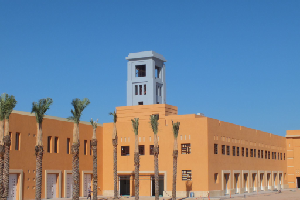Straße des 17. Juni 135, 10623 Berlin, Germany
Career Counselling

Technische Universität Berlin is a renowned institution of higher education located in the city of Berlin, Germany. As one of the oldest research institutions in the country, it has provided the framework for many other German Technical Universities. More than 35,000 students are enrolled at TU Berlin, of whom nearly a third are from outside Germany, creating a diverse, cosmopolitan, and vibrant atmosphere.
Academic and research activities at TU Berlin are divided into 7 Faculties (Humanities & Educational Sciences, Mathematics & Natural Scien...
| Establishment year | 1770 (earliest precursor) |
| Total Students | 35,470 |
| International Students | 10,169 |
| QS World University Rankings 2024 | =154 |
| Campus Size | 149 acres |
| Total Number of Campuses | 4 |
| University Website | https://www.tu.berlin/en/ |
| No. of Schools and Divisions | 7 Faculties |
| Nobel Prize Winner Alumni | 10 |
| No. of Education Programs | 50 (undergraduate), 90 (Master’s) |
| Student to Faculty ratio | 11:1 |
TU Berlin offers undergraduate and postgraduate courses through 7 Faculties, which are further subdivided into Departments, Centers, and Institutes.
International applicants to undergraduate programs at TU Berlin must satisfy the following requirements:
Applicants to postgraduate programs must satisfy similar eligibility criteria. However, detailed academic transcripts from a recognized undergraduate degree must be submitted. Every Master’s program has specific requirements. For example, the Faculty of Economics and Management mandates professional experience for students applying for the Master of Business Administration program. Some programs in the Faculty of Humanities and Educational Sciences may require the submission of a creative portfolio.
International applicants (from outside the European Union) to undergraduate programs at TU Berlin fall in Applicant Group C. The following steps are involved in the process:
Applicants to Master’s courses must follow a similar procedure. However, a maximum of one application can be submitted. In addition, applicants from certain countries, including India, must submit additional documents. A mandatory feature of the admissions process at TU Berlin is enrollment. After the University sends an offer of admission, successful candidates must pay the fees for their first semester, and select the courses that make up the credit requirement. The confirmation of enrollment is an essential step in applying for a German student visa. After arriving in Berlin, students must present original documents to the University International Office in order to confirm their admission to TU Berlin.
Most students at TU Berlin do not have to pay tuition fees, except for those enrolled in continuing education postgraduate programs. The only fees payable to the University are semester fees, which have the following components. They must be paid twice a year.
Living costs in Berlin are among the highest in Germany. Low cost student housing is available, with a monthly rent of 300 to 400 Euros; however, most students enrolled in TU Berlin opt for private housing, where the rent can exceed 600 Euros per month. Food costs range from 200 to 300 Euros per month. Students must also budget for other living costs, including phone and internet charges, transportation passes, shopping costs, and the cost of study materials. The total living expenses are approximately 100 Euros per month, on average.

The main campus of TU Berlin is located in the Charlottenburg Wilmersdorf region of the city. All seven academic Faculties have buildings in this campus, which is located near one of the most prominent streets of the city. The other three campus locations are in Wedding, Tempelhof, and Dahlem, and house various research and recreation facilities. All campuses are well connected via public transport, and University students can purchase a low cost pass to easily travel through the city by bus or metro. The campuses are sustainable and green, with almost 1,600 trees spread across the different locations.
Sports courses are an important feature of campus life at TU Berlin. TU Sport organizes regular training sessions for students and staff members, with over 1,150 different classes. The most skilled athletes represent the University at intercollegiate competitions, national and international levels. All four campuses are well equipped with gyms, track and field venues, outdoor grounds, and indoor venues. These allow students to pursue their sport or fitness activity of interest, from football to yoga.

Cultural events are an integral part of the TU Berlin fabric. The Language and Culture Exchange allows students of all nationalities to immerse themselves in foreign cultures, thereby gaining a deeper insight into diversity. Collegium Musicum is the umbrella organization under which music enthusiasts in the TU Berlin community come together in choir and symphony orchestra ensembles. There is also a Campus Film club that screens a critically acclaimed movie every week. The Campus in Transition initiative celebrates the sustainable nature of all TU Berlin locations, and spearheads initiatives such as rooftop solar energy installations.
There are several scholarships for international students enrolled at TU Berlin. The DAAD Scholarships are provided by Germany’s Academic Exchange Service. Students must apply via the German Embassy or Consulate in their home country before arriving in Berlin. While applying, candidates must submit proof of enrollment in an undergraduate or postgraduate program. Previous academic records must also be submitted, and the amount awarded is variable, depending on the duration of the scholarship.
The most prestigious scholarship (open to both undergraduate and postgraduate students) is the Deutschland Stipendium. This awards students 300 Euros per month during the duration of the academic year, which amounts to approximately 30% of the average living cost. It is awarded based on academic merit and future potential, with consideration given to a good social work record and students with societal or physical disadvantages. There is no limit on the total number of awardees.
The Friedrich Ebert Foundation awards scholarships to domestic and international students based on financial need. It was originally founded to allow candidates from working class backgrounds to access high quality education. Chosen students are supported throughout the duration of their UG or PG degree program on two dimensions: registration fees and living costs. Students who have a history of working towards social equality and justice are also strongly considered for this scholarship.
